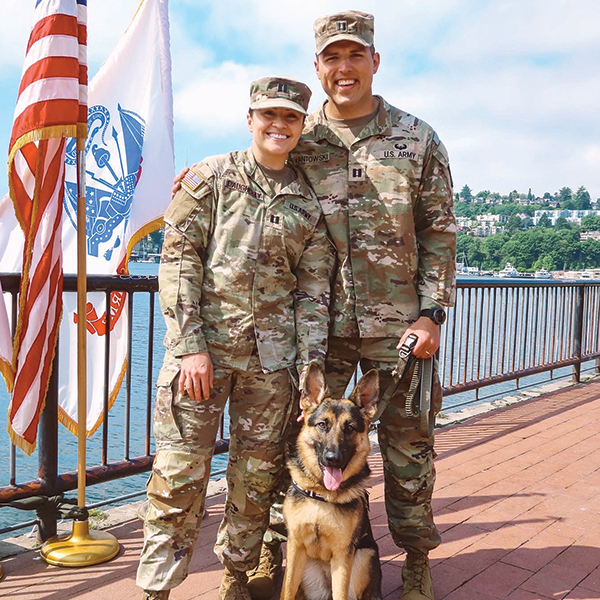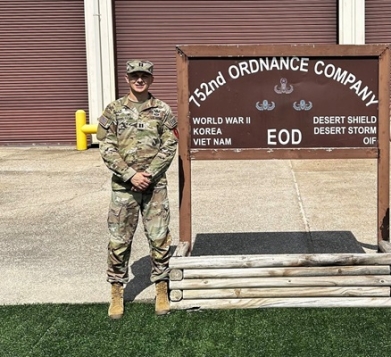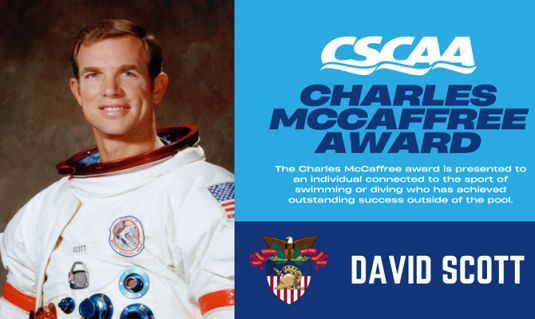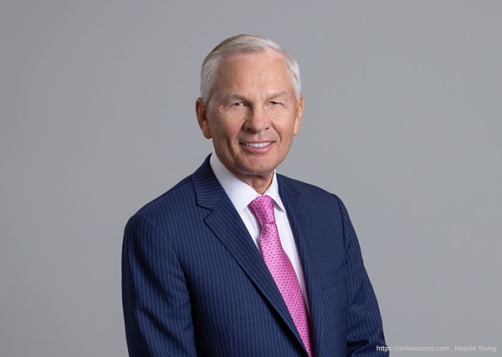By CPT Madison Daugherty ’19, Guest Author
Imagine a “good cadet.” Picture the cadet in crisp India whites, red sash cinched across the waist, ring securely affixed to the finger, with stars and wreaths and wings glistening on the chest. Imagine someone in a position of responsibility and effortlessly mixing with foreign dignitaries. Imagine the unrivaled “best of the best of the best” that West Point has to offer.
Now, imagine a “bad cadet.” Picture her in disheveled white-over-gray, red sash limp at her waist, with her nametape on the wrong side of her chest. It’s on the wrong side because no one noticed it—not even her—before she reported with her chain of command to the Commandant’s Office. Imagine her positioned on the carpet she can’t look up from and shamefully plodding the pavement in Central Area. Imagine the unrivaled worst of what West Point has to offer.
I’m her. And this is a West Point story.
I didn’t expect much from the 2023 West Point Society of Washington’s (WPS-WA1) Founders Day celebration. At best, I could practice networking before transitioning out of the Army next spring. At worst, it would be a reminder of the scar tissue that said I was hardly worthy of being an “Old Grad.” So, when I was notified that I would be expected to give the “youngest grad” speech, I was sure there had been a mistake. There needed to be a mistake—whatever shreds of dignity and self-preservation I typically clung to in these circles depended on it.
“I don’t think people want to hear from me: I wasn’t a ‘good cadet,’” I softly murmured to John Higgins ’87. He replied, “I think you have something valuable to share. Make it constructive. Teach us something we don’t know a lot about, and you’ll do great.” And then he gave me a prompt: How did West Point prepare you to serve and succeed? What did West Point teach you?
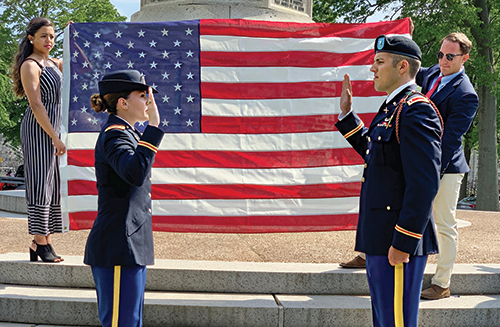
I had no illusions that I would share earth-shattering revelations about the West Point experience or profound insight regarding today’s junior military officers. Instead, it was my goal, and my sincerest hope, that my testimony would be a mirror in which every graduate and cadet could see themselves—a mirror that reflects the sting of failure, the power of adversity, the sweetness of success, and the grace of redemption.
Against the backdrop of dinner chatter and the soft clinking of silverware, an audience expecting to hear inside jokes about Dean’s Hour naps or quirky anecdotes about my first days as a platoon leader instead heard me begin describing my time in the Academy Mentorship Program (AMP). I retold the story of being remanded to AMP on May 17, 2017 of my firstie year—10 days before graduation—after being found guilty of an honor violation. I was assigned as a 31B Military Police Specialist on orders to Advanced Individual Training at Fort Leonard Wood, Missouri, and then to the 504th Military Police Battalion at Joint Base Lewis-McChord, Washington. After successfully completing the program and demonstrating professional-ethical behavior and commitment, I could reapply to resume my journey to graduation and commissioning.
In front of a hushed audience, I laid bare the shame, anger, and bitterness I felt leaving West Point “in the rearview mirror” as a failure. I recounted my own icy disdain when I arrived at the Military Entrance Processing Station, reporting to Bravo Company, 787th Military Police Battalion. I didn’t deserve to be there, and I turned my nose up at how beneath me all of it was. In truth, it’s something I’m deeply ashamed to admit, but it’s how I felt at the time.
My throat burned as I told the WPS-WA1 audience about befriending my fellow trainees and how I quickly realized that the “worst thing” that had ever happened to me was the greatest opportunity some of them have ever had, or will ever have, in their entire lives. I was right—I didn’t deserve to be there; but I had the opportunity to be there, and that opportunity became one of the greatest honors I’ve ever known.
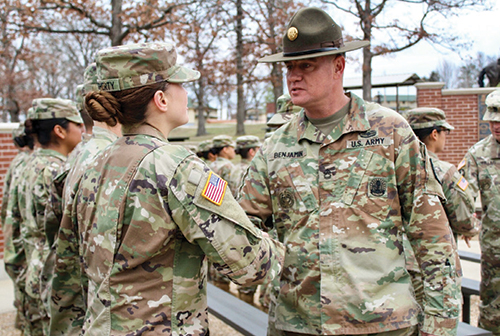
Each of these soldiers represented real people I would someday be called to serve, care for, and lead. Each of them was a real person with real problems—complicated home lives, financial hardships, emotional wounds, and personal traumas—but they also possessed incredible gifts. The gravity and comprehension of their individual commitments to service humbled me, and a new foundation was leveled and made clean. The acceptance, love, and camaraderie I experienced from total strangers transformed me. It made me want to be the kind of leader that cared about all my soldiers’ problems, not just the ones I’m supposed to.
I concluded my speech with the question posed: “What did West Point teach me? West Point taught me a lot, arguably much more than the average cadet. And I stand before you a woman of integrity, determination, and grit because of it… and I am forever grateful.”
My story finally spoken. The span of two years recounted in just eight minutes. I slowly lifted my gaze, preparing myself for skeptical glances and sidelong whispers, and watched—in shock—as the room erupted in applause and a wave of standing ovations. It took everything for me not to buckle under the emotions filling my chest. I had shown them the mirror and they hadn’t seen a “bad cadet”; they had seen themselves.
What followed in the hours, days, and months since was nothing short of surreal. That night I gripped hands with countless members of the Long Gray Line, misty eyed and smiling, who said things like:
- I went through something similar, and I’ve never felt good enough. You have no idea how much you’ve done tonight.
- Our son/daughter is a cadet right now. I wish they could’ve heard your speech.
- We didn’t have the Academy Mentorship Program in my day. I think we lost some great people who would’ve benefitted from a second chance.
The response was so overwhelming that I published the speech on LinkedIn and was flooded with messages, emails, and phone calls from grads and non-grads who all saw themselves in the mirror. Each message was unique, but the same themes reflected on the surface. Many grads empathized with my story, while sharing deeply personal anecdotes of their own and calling themselves “bad cadets” in the process. I understood they didn’t mean “bad cadet”; they were really saying: “I was unconventional, too”; “I also needed a second chance”; and “Like you, I kept going and it made me better.”
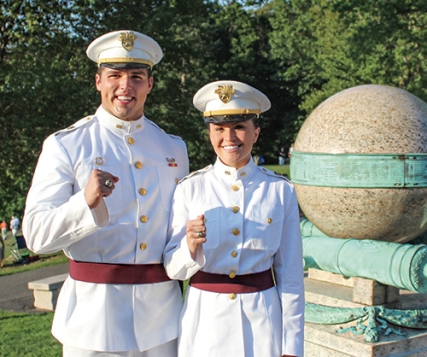
One of the most impactful messages I received was from a cadet. This cadet, like me, violated the honor code and had punishments meted out: hundreds of walking hours; loss of pay, rank, and privileges; and placement into the Special Leader Development Program for Honor. As I listened to the cadet’s story I was struck by the maturity and humility displayed, and something both old and familiar knotted in my stomach when the cadet expressed difficulty coping with how raw and vulnerable things still felt. The cadet shared aspirations to eventually branch combat arms and join the Special Forces community. We remain in touch, and I could not be more proud or excited for this cadet. Few could walk the road this person is on. No one will convince me otherwise.
Finally, I received a message that simply read: “THIS is a West Point story!”
I read that message and had an epiphany. This is a West Point story, but it isn’t mine alone. It’s a story shared by many. If my story resonates, I can assure you it has very little to do with me and everything to do with the people that make it worth telling. It’s a story of a cadet that is at West Point right now, as you read this, fighting tooth and nail to be worthy at the finish line. It’s a story of my three friends who also matriculated through AMP—Ben, Justin, and Brad—and returned to West Point from the 82d Airborne Division with Ranger Tabs and airborne wings. It’s a story that reminds us that we’ve all fallen short but remain capable of serving others and our Army honorably.
CPT Madison Daugherty ’19 is a battalion operations officer with the U.S. Army Seattle Recruiting Battalion. She received her MBA from the University of Southern California Marshall School of Business in 2022 and will be transitioning out of the Army in May 2024. Madison is married to Lee Kantowski, her former USMA 2017 classmate, and—after walking 100 hours together their firstie year—maintains that “their story” is her favorite. “So Others May Dream”; “So Freedom May Reign”; Go Army, Beat Navy!
What do you think? Click here to answer 3 questions.

